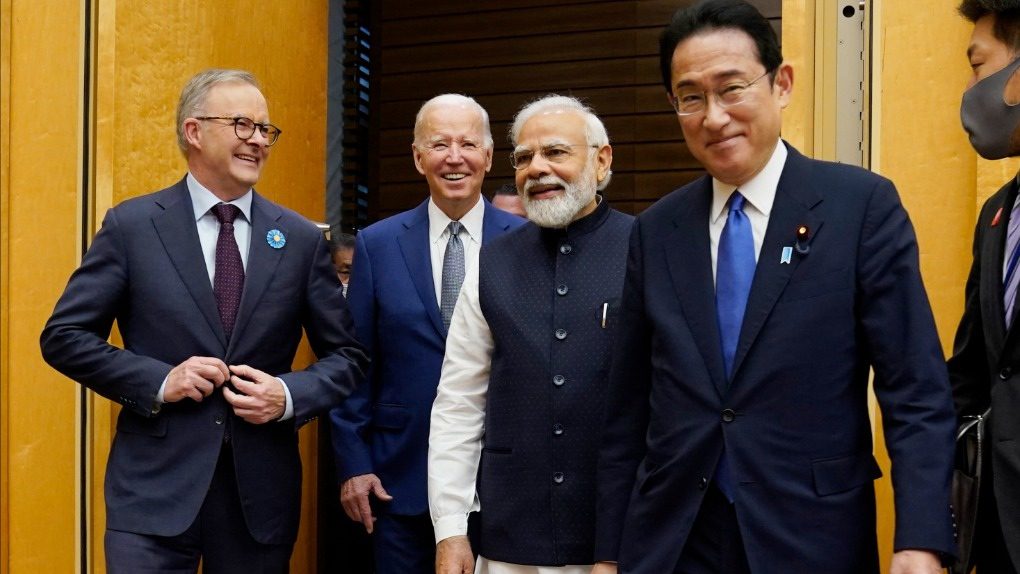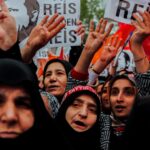Global Courant 2023-05-15 08:03:53
TOKYO –
The Group of Seven Rich Democracies summit in Hiroshima this week will feature eight other host nations, part of a complicated, high-stakes diplomatic game designed to settle the world’s most serious crises.
Japanese Prime Minister Fumio Kishida has invited South Korea, Australia, India, Brazil, Vietnam, Indonesia, the Comoros and the Cook Islands.
Analysts say Kishida hopes this mix of countries will help resist China’s assertiveness and Russia’s invasion of Ukraine. He also wants stronger ties with US allies and with developing countries and wants to make progress in working towards a nuclear-weapon-free world, something that seems increasingly difficult amid North Korean and Russian nuclear threats.
Here’s a look at what to expect as the wealthy world leaders welcome these host nations:
REDUCING CHINA, RUSSIA
As their top diplomats did last month at a meeting in Nagano, Japan, the leaders of the G-7 countries – the United States, Japan, the United Kingdom, France, Germany, Canada, Italy and the European Union – will try to to form a united front against Chinese threats to Taiwan and Russia’s war against Ukraine.
“The G-7 is committed to maintaining international order, and most of its members are in Europe, so supporting Ukraine against the Russian invasion is a top priority,” said Leif-Eric Easley, a professor at the Ewha University in Seoul.
“As a pillar of the G-7 in Asia, Japan is particularly focused on updating the international order to deal with China’s rise,” said Easley. “The Kishida government’s agenda and special invitations to the Hiroshima summit reflect an effort not to contain China, but to expand the international coalition that defends standards of state conduct.”
The eight host countries have complex political and economic ties with China and Russia.
India is part of the Quad group of four Indo-Pacific nations, which also includes the United States, Japan, and Australia. China has accused that group of representing an “Asian NATO”. As for the war between Russia and Ukraine, India has abstained several times on UN resolutions against Moscow, though it has stressed the need for diplomacy to end the war. It has increased its imports of Russian oil.
Brazil is a member of the so-called BRICS group of developing countries, which includes China, Russia and India. Brazilian President Luiz Inacio Lula da Silva recently visited China to strengthen ties with its largest trading market. He has also irritated Ukraine and some in the West with his stance on the war, recently suggesting that Ukraine cede Crimea to forge peace.
Japan is courting Vietnam because it also has territorial disputes with China, according to Kim Yeol Soo, an expert at South Korea’s Korea Institute for Military Affairs.
‘GLOBAL SOUTH’ NATIONS
Kishida has said his list of host countries reflects the importance of the so-called “Global South” countries. This is a term used for developing countries in Asia, Africa and Latin America.
The G-7 countries account for about 40% of the world’s economic activity, down from an estimated 80% of global gross domestic product in the 1970s.
“When the UN passes resolutions, you see a significant number of the 190 or so member states being ‘Global South’ countries,” said Choi Eunmi, a Japan expert at the Asan Institute Policy Institute in South Korea.
For example, Indonesia’s importance to Japan is related to its abundant natural resources and economic potential, said Kim, the expert.
India is this year’s chairman of the G-20, which is seen as a crucial bridge between the economies of the G-7 and the South. Japan has traditionally had close ties with India, where Kishida visited in March for a summit with Indian Prime Minister Narendra Modi.
In response to questions from The Associated Press, Japan’s foreign ministry said the G-7 and other countries should work with the Global South to address issues of energy, food security, climate change, health and development.
US allies
Japan’s invitation to South Korea reflects the neighboring countries’ role as staunch allies of the US with a shared security threat from North Korea’s advancing nuclear arsenal.
In recent weeks, Kishida and South Korean President Yoon Suk Yeol have taken important steps to increase security and economic cooperation and to move past the historical grievances that arose from the Japanese colonization of the Korean peninsula in 1910-1945.
The Japanese Foreign Ministry’s response to a question from AP praised Yoon for “active diplomacy demonstrating commitment to peace and prosperity in the region, including the announcement of the Indo-Pacific strategy.”
Kishida, Yoon and US President Joe Biden are expected to meet on the sidelines of the G-7 summit to discuss North Korea’s nuclear ambitions, China’s growing influence and the war between Russia and Ukraine.
Australia, also a key US ally, is already working closely with Japan, including in efforts to achieve a “free and open Indo-Pacific,” according to Japan’s foreign ministry, which has Australia a “special strategic called partner.
Last year, the two countries signed a new security agreement covering military, intelligence and cybersecurity cooperation to counter the deteriorating security outlook due to China’s increasing assertiveness. It was Japan’s first agreement with a country other than the United States.
——
OTHER PROBLEMS
Some of the host nations lead regional and other bodies.
Brazil will take over India as president of the G-20 next year. Indonesia is the president of the Association of Southeast Asian Nations. The Comoros lead the African Union and the Cook Islands chair the Pacific Islands Forum.
Japan is stepping up its security and economic ties with the 18 Pacific Forum countries, in part to counter growing Chinese influence there. Observers say the Cook Islands’ invitation is an expression of Japan’s respect for the Pacific nations, which are concerned about the planned release of treated but still radioactive wastewater into the Pacific Ocean from the tsunami-ravaged nuclear power plant from Fukushima in Japan.
Kishida is from Hiroshima, one of two Japanese cities hit by American nuclear bombs at the end of World War II. Keeping the summit in his hometown gives him a chance to lay out his determination to build a nuclear-weapon-free world.
Due to North Korea’s pursuit of nuclear missiles intended to hit the US mainland, “it would be a little uncomfortable if Japan didn’t take on South Korea, which faces North Korea’s nuclear threats” said Choi, the expert.
——
Kim reported from Seoul, South Korea.








